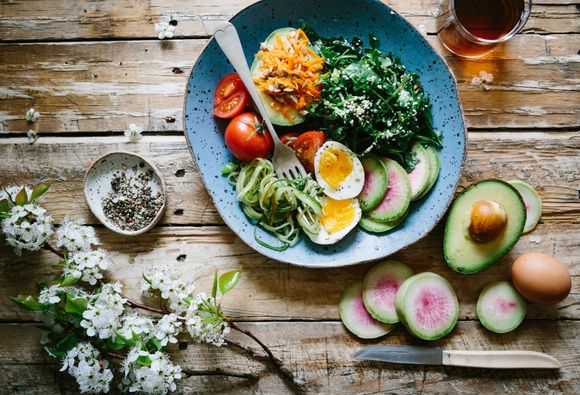Author: Rositsa Tashkova, Master of Molecular Biology and Microbiology
In this article you will find the ranking of the 10 most searched diets on Google in 2020. As well as a brief description of each of them.
- Keto diet or ketogenic diet - 25.4 million searches;
- Intermittent fasting - 11.7 million searches;
- Paleo diet - 3.8 million searches;
- DASH diet - 2 million searches;
- Atkins diet - 1.5 million searches;
- Military diet - 954 thousand searches;
- Sirtfood diet - 927 thousand searches;
- Whole30 diet - 558 thousand. searches;
- Alkaline diet - 549 thousand searches;
- Noom diet - 540 thousand Searches.
1. Ketogenic Diet (Keto)
The goal of keto diet is to get your body into a so-called ketosis mode or, in other words, to make your body get energy only from fat and not from carbohydrates. To achieve this, it is necessary your menu to be extremely low on carbohydrates: 30-50 grams per day, enough protein and a lot of fat.
This diet is similar to other low-carb diets, e.g. Atkins diet, in which a person can eat as much as they want without counting their calories, as limiting carbohydrates leads to a lower calorie intake with food.
Atkins diet has been known since 1972, but at the time it was perceived as dangerous and dismissed as potentially raising bad cholesterol levels. [ref.1]
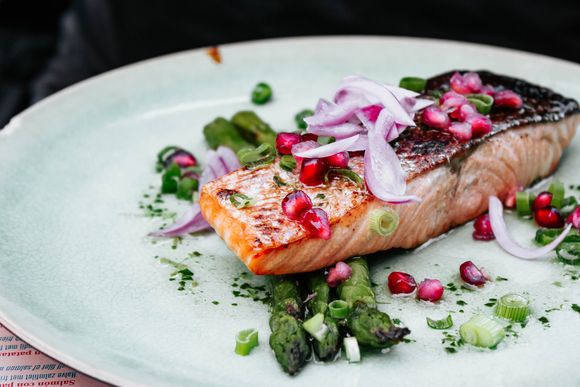
2. Intermittent Fasting
We could call intermittent fasting a diet, but it is more of a long-term lifestyle. It alternates phases of fasting with drastically reduced or completely limited caloric intake with periods of normal eating. Or to put it simply - it does not change what you eat, but when you eat it.
There are a total of 3 varieties of fasting, which are based on the principle of fasting:
- Daily fasting - eating in fixed time "windows" from 4 to 12 hours daily;
- One-day periodic fasting or intake of a minimum amount of food;
- Fasting-mimicking diets aimed at bringing the body to a fasting-like state by reducing caloric intake.
From a scientific point of view, the lack of food intake for a long enough time allows your body to enter a different metabolic regime, in which fat burning increases. [ref.2]
It is believed that periodic fasting increases sensitivity to insulin, regulates blood pressure and reduces the impact of free radicals.
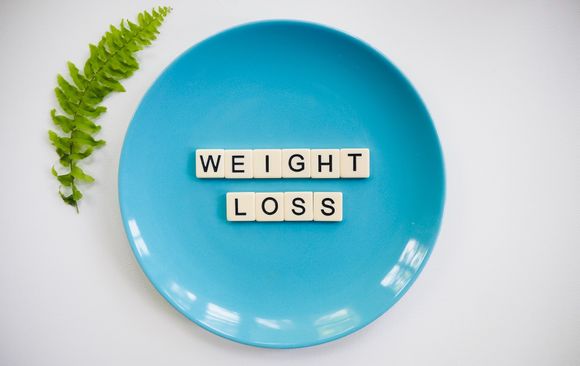
3. Paleolithic Diet (Paleo)
The Paleolithic diet is a diet that is presented as "the diet of our ancestors" - the hunter-gatherers. In general, it includes large consumption of vegetables, fruits, lean meat, fish, eggs and some nuts and seeds.
Paleo diet recommends the elimination of dairy products, whole grains, beans and legumes, because cavemen were not farmers, but hunters and gatherers. [ref.3] Unfortunately this can deprive the body of important nutrients and elements.
4. DASH Diet
DASH stands for Dietary Approaches to Stop Hypertension. It was created 20 years ago to help those suffering from high blood pressure.
The DASH diet does not require the complete exclusion of specific foods, but the achievement of easy daily and weekly nutritional goals. [ref.4] It recommends that your diet includes:
- Plenty of vegetables, fruits and whole grains (to be included in 4-5 servings daily).
- Skimmed or low in fat dairy products, fish, chicken, beans, nuts and vegetable oils.
- Restriction of foods high in saturated fats, such as fatty meats, whole milk products and tropical oils such as coconut, palm kernels and palm oils.
- Restriction of sugar-sweetened beverages and sweets.
- It is necessary to consume foods that: are low in saturated and trans fats, are rich in potassium, calcium, magnesium, fiber and protein, have a lower sodium content.

5. Atkins Diet
Atkins diet was initially popularized by physician Dr. Robert S. Atkins, who wrote a bestseller about it in 1972. It has not been well received by the medical community, but today it is again followed by many people who want to lose weight. [ref.5]
In this diet, proteins and fats are consumed in unlimited quantities, but almost no carbohydrates. Atkins diet runs in 4 phases:
- Phase 1 (induction): less than 20 grams of carbohydrates per day for 2 weeks. Foods high in fat and protein, low-carbohydrate vegetables (e.g. leafy vegetables) are consumed.
- Phase 2 (balancing): more nuts, low-carbohydrate vegetables and small amounts of fruits are slowly added to the diet.
- Phase 3 (fine-tuning): occurs when you are very close to the desired weight, adding more carbohydrates to the diet until weight loss is delayed.
- Phase 4 (maintenance): in this phase you can eat as many healthy carbohydrates as the body tolerates without starting weight gain.
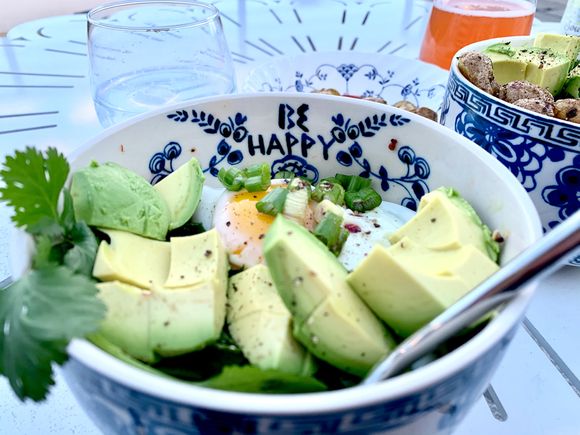
6. Military Diet
The Military diet (also called The 3-day diet) has nothing to do with the military and has not been applied for similar purposes in the army. It is claimed that you may lose 4.5 kg a week. During the first 3 days, the daily intake is only about 1100-1400 calories divided into 3 dishes - breakfast, lunch and dinner. Over the next 4 days, the intake increases slightly.
This is repeated until reaching the desired weight, but essentially this is starving, which will lead to the restoration of the initial weight after termination of the regime - the so-called yo-yo effect.
7. Sirtfood Diet
This diet was promoted by singer Adele and this is why it has gained great popularity, although there is no scientific data on its effectiveness. It was created in 2016.
According to proponents of the diet, some plant foods, known as "sirtuin activators", can boost the body's metabolism and lead to weight loss, rejuvenation and reduce inflammationin the body. Such foods and drinks are: red wine, dark chocolate, berries, soy, walnuts, coffee, matcha green tea, extra virgin olive oil, cabbage, parsley, red onion and turmeric. [ref.6]
The diet proceeds in two phases. For the first three days of the first phase, only 1000 calories are consumed per day, consisting of a dish rich in sirtuin foods and three green juices. Then on the 4th to the 7th day - two dishes rich in sirtuin foods and two juices - a total of 1,500 calories per day. The second phase lasts 2 weeks and its purpose is maintenance.
Since the daily calorie intake is very low , there is a danger that after the diet the weight will rise again.

8. Whole30 Diet
This diet appeared in 2009 and is quite popular to this day. It promises that in 30 days all aspects of your life will improve if you exclude alcohol, added sugar, cereals, dairy products, legumes from your menu.
After the 30th day, you can start consuming some of these foods some of these foods, monitoring your body's reaction. If you break the rules of the diet even once, you start over. There is no scientific evidence for the effectiveness of the diet.
9. Alkaline Diet
This diet is based on the unscientific notion that "acidic" foods lead to cancer, arthritis and other serious diseases. It excludes foods such as dairy products, eggs, meat, whole grains, processed foods, coffee and alcohol. Fruits and vegetables, soy, tofu, some nuts, seeds and legumes are consumed.
However, our body has a strictly balanced system through which it does not allow variations in pH (acidity and alkalinity) in our internal environment, maintaining it constantly. Therefore, it is not possible to "acidify" or "alkalize" our body through food. Deviations in physiological pH are associated with severe conditions such as acidosis, for example, but we will certainly know if this happens to us, and treatment will not be carried out through diet.
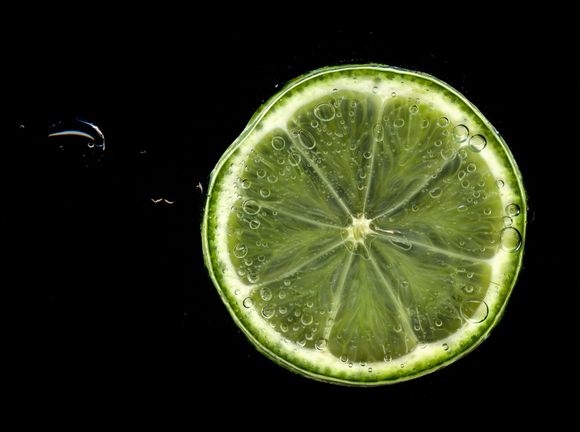
10. Noom Diet
The Noom diet is connected to new technologies and can be said to be the most innovative of all. It is related to the use of the Noom mobile app and aims to create useful eating and motor habits in its users. [ref.7]
The app acts as a personal coach and offers two 16-week programs - for weight loss and for diabetes prevention.
Our advice is before choosing a method of weight loss or healthy life, ask yourself whether there is a scientific justification behind it or vice versa - a scientific rebuttal to the claims. New and new diets are often offered for the sole purpose of profit.
So let's be sensible and not risk our health by starving ourselves. Let's not forget that to achieve results, proper nutrition must be combined with adequate physical activity and training. This way the result will not be delayed and will be sustainable.
